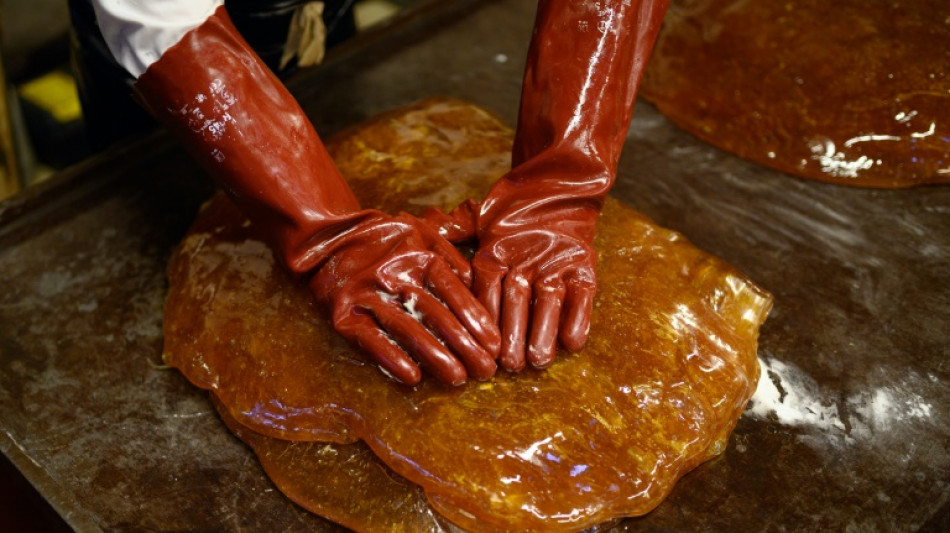

Traditional UK sweet factory enjoys global sugar rush
Edward Gray sweet factory in central England evokes a bygone age where brass cauldrons steam with molten sugar and workers wrestle with huge chunks of gooey treacle, but its handmade produce now enjoys a global demand.
The company -- also known as "Teddy Grays" -- dates back to 1826 when John Gray went house-to-house in a horse and cart buying homemade sweets, before selling them to retailers.
But it was his son Edward, an entrepreneur in the mould of Willy Wonka and Colonel Sanders, who built the business's name.
The small factory in Dudley now makes around five tonnes of boiled sweets a week, with products including rhubarb and custard, pineapple rock, strawberries and cream, pear drops, toffee and chocolate-coated coconut ice.
But the jewel in the crown is its "Herbal Tablet", a menthol sweet that it claims has provided relief from "cold nights and mornings" for more than 100 years.
"It's an acquired taste, but with Covid now, it relieves coughs and colds," explained Dave Healy, the company's marketing manager.
- Secret recipe -
The secret recipe is locked in a vault in a nearby bank. Two descendants of the founder are the only people alive aware of its contents.
"They wouldn't tell me because I talk in my sleep," joked Healy. "It's all down to the blending, if you don't get the blend correct, you get an oily taste."
The sweet was only really known in the surrounding area, known as the Black Country because of the smoke and soot of its industrial past.
But the fashion towards local and artisan produce, coupled with endorsements from celebrities such as actor and writer Stephen Fry, has seen its fame spread.
"When Covid kicked in we opened an online sweet shop... just to basically generate some sort of movement of the stock," said Healy.
"But we've had requests from America, Korea, Japan, Australia."
A lot of the interest comes from those who moved long ago out of Dudley, some 10 miles (16 kilometres) west of Birmingham, and who are yearning for a taste of nostalgia.
"They say in their emails they used to live in Dudley, used to love the smell of the factory," he said.
- Another fine mess -
Despite the incessant demand, the factory has no plans to expand, preferring to maintain its intimate feel and traditional ethos.
"Because the old-fashioned machines only go so fast, the only way you're speeding up is by putting on a smaller cog so it spins faster.
"But you can't expand the factory because it's in a residential street. It is a museum-status factory..., you couldn't develop it."
Healy warned that counterfeit herbal pills were on the market, and to look out instead for the logo of a Wirehaired Fox Terrier on the packet.
The logo harks back to Edward "Teddy" Gray, who was also a champion dog-breeder and once won the world-renowned Crufts dog show.
"In them days, the old Mr Gray was very much like a celebrity in his area," said Healy.
"They were proper well-to-do, mixing with the stars like Laurel and Hardy," he added.
"Apparently, the story goes that Laurel and Hardy actually stopped at the factory.
"There's a house in the middle of the factory. When Laurel and Hardy came to perform at the Hippodrome, Ted Gray offered them somewhere to stop for the night."
While having to sleep overnight in a sweet factory might sound like a preamble to one of their calamitous adventures, the pair reportedly had a pleasant time and "wrote to say thank you for being such a wonderful host".
- Soaring costs -
Although demand is soaring, the firm is suffering from the current supply chain issues and soaring inflation.
"We had terrible problems getting the sugar in October, then it went from sugar to glucose in December," explained Healy.
"Glucose is going up 50 percent. Their gas bill has gone up 300 percent, the glucose people.
"We couldn't put our stuff up 50 percent, they wouldn't stand it."
Whatever the supply constraints, it is unlikely he will go without his fix.
"I eat them all the time. Someone's got to test them, it's like a quality control. It's not a bad thing, though I wish it was a brewery."
Y.Hube--MP




